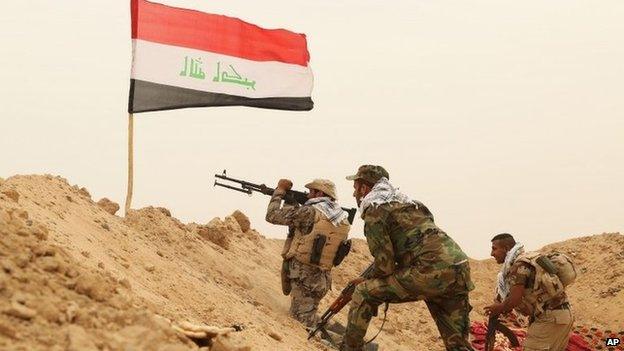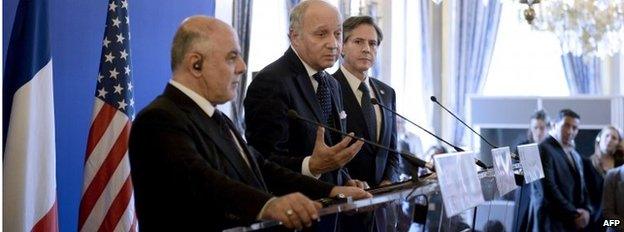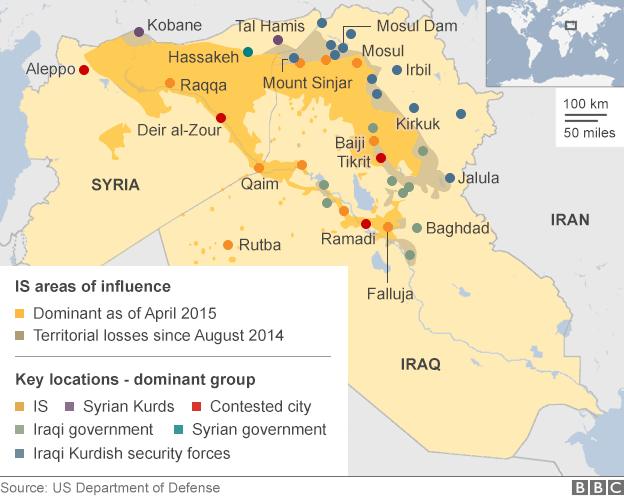Iraq coalition winning against IS, says US
- Published

Shia volunteers have become more prominent in the fight against IS in Iraq
Iraq and its allies are pursuing "the winning strategy" to combat Islamic State in Iraq, US Deputy Secretary of State Antony Blinken has said.
Mr Blinken said air strikes and supporting Iraqi forces was the right way to tackle the IS threat.
Ministers from 20 countries debated the issue in Paris - though Russia, Iran and Syria were absent.
Iraq's prime minister said other countries had a duty to support it in its struggle against IS.
Haider al-Abadi earlier called the advance of IS a "failure" of the world.
But at a news conference with Mr Blinken and French Foreign Minister Laurent Fabius following the talks, Mr Abadi said he had received fresh commitments of help from allies.
IS has recently made gains in Iraq despite US-led coalition air strikes.
Last month, IS militants seized Ramadi in Anbar, Iraq's largest province, as well as the strategically important Syrian town of Tadmur and the neighbouring ancient ruins of Palmyra.


Analysis: Frank Gardner, BBC security correspondent, Paris
Side by side, the leaders of the Iraqi, French and US delegations faced the media to deliver their upbeat assessments of what was agreed behind closed doors.
A plan had been approved to quickly retake Ramadi from IS, said the Iraqi prime minister, promising a more inclusive policy towards his country's disenfranchised Sunnis.
The US deputy secretary of state said much had been achieved against IS in the last nine months, a claim many would dispute. The focus today, he said, was on stopping the flow of foreign fighters coming in from Turkey and challenging the jihadist ideology.
There had been setbacks, they all conceded, but no-one was prepared to say the unthinkable: that one year after IS seized Iraq's second city of Mosul almost without a fight this brutal, oppressive group is now bigger, richer and more dangerous than it was this time last year.
The one thing everyone agreed on is that the international campaign against IS was going to take a very long time.

Weapons pledge
Mr Blinken - who represented the US at the meeting in the absence of Secretary of State John Kerry, who broke his leg in a cycling accident - hailed Mr Abadi's plan to tackle IS advances in Iraq's western Anbar province.
He said that included training and equipping local tribes to join the fight, improving weapons provision, expanding and improving army and police forces, and supporting a new "development fund for stabilisation" to get immediate assistance to areas won back.
He said IS controlled 25% less Iraqi territory than it did when the coalition came together nine months ago.

"This will be," he said, "a long campaign, but we will succeed if we remain united, determined and focused."
Mr Abadi earlier complained that sanctions against Russia and Iran had made it difficult for Iraq to buy more weapons, saying the country had received "almost none".
Mr Blinken said the US would ship anti-tank rockets to Iraq for use against suicide vehicles.
Mr Abadi also said he had received commitments that foreign countries would help stop the flow of foreign fighters into IS as well as tackling the illegal trade in petrol and antiquities - "the means by which Daesh [IS] has been financing itself".
"Each drop of petroleum which crosses the border is also a drop of blood," Mr Abadi said.
Sensitive situation
Iraq has become increasingly reliant on Iranian-backed Shia militias to take on IS in recent months, raising fears of worsening sectarian tensions as they seek to drive the jihadist group out of predominantly Sunni areas like Anbar.
How is Islamic State run?
The role of the militias is adding to what France has called "an especially fragile" situation, reports the BBC's Lucy Williamson in Paris.
The meeting comes a day after an IS suicide attack on a police base in Anbar province killed at least 45 people.
Those who died were initially thought to all be federal police officers but a source later told the BBC that 15 Iranian military advisers were among them.
A senior security source in Anbar meanwhile told the BBC that the "final touches" were being put to plans to drive IS out of Ramadi.
The source said six Iranian-made rocket launchers had been transported to the frontline and that 3,000 fighters had completed basic training near Habbaniya military base, east of Ramadi, in preparation for the assault on the city.